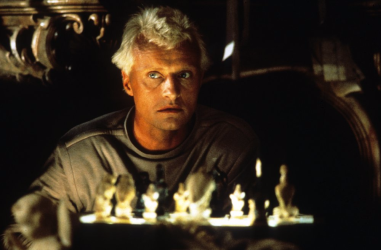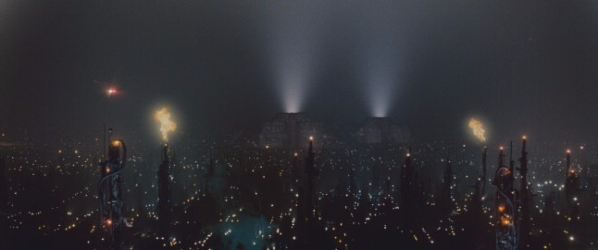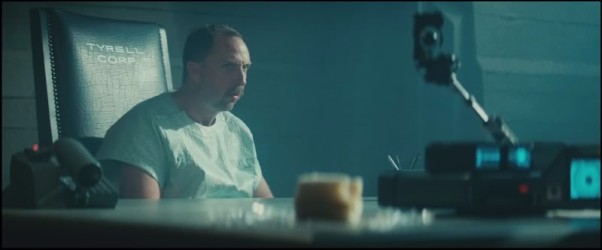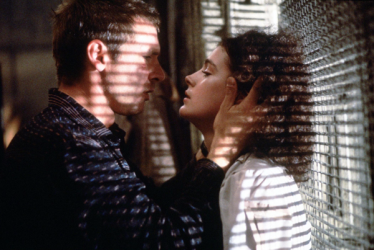Few movies of the past 35 years have been as influential as Ridley Scott’s 1982 science-fiction classic Blade Runner. Most of the sci-fi of these past few decades have wanted to be either Blade Runner or Road Warrior—moreso, stylistically, than even Star Wars. Producers wanted Star Wars’ box office but not really its cheerful, retro feel (like its almost campy scene transitions, hearkening back to the old Flash Gordon serials). Blade Runner and Road Warrior, on the other hand, were, real, man. They were gritty visions of an inescapable future.
Not quite as bad as what we might call “Zack Snyder disease” is today, but still pretty awful.

Humongous wants you to embrace the realism.
Blade Runner also had a huge influence on literature, being released two years before Neuromancer, William Gibson’s grim take on the future that sounded the starting gun on a cyber-implant, corporate-ruled-dystopia which, in retrospect, was no more realistic than utopic ’50s jetpack sci-fi, but a lot more dreary. It was also a big influence on video games.
Which is, all-in-all, not bad for the film that finished 27th at the Box Office in 1982, behind Tron, Lee Horsley’s magnum opus The Sword and the Sorceror and, of course, The Best Little Whorehouse In Texas. (It did beat out another iconic film: John Carpenter’s The Thing. So, it’s got that going for it.)
The movie tested so poorly that a desperate Ladd Company hacked it up and added a notoriously bad voiceover (by Harrison Ford) trying to explain the plot. This gave the movie an ersatz ’40s film-noir detective feel, which should have been a good thing, but (probably because they did it without any of the talent on board, except a frustrated Ford) just made hash of the whole experience. As such, there are no less than six subsequent cuts of this film trying to salvage it.

Rutger Hauer thinks seven versions is excessive.
We saw “The Final Cut”, which is Ridley Scott’s last word on what he was trying to say and do here.
And it sucks.
I kid! I kid! but not as much as I wish I were. The truth is, Blade Runner is one of the most frustrating experiences you can have in a movie theater. Why? Because it is staggeringly beautiful. Even 35 years later, the special effects are the best practical effects have to offer. As I’ve maintained in this past 18 months (where we’ve shifted our moviegoing to half-or-more revivals of classics), what works, long-term, for special effects is not whether they look “realistic”. The word “realistic” really just means “conforms to the current idea of how this impossible thing might look”. Plenty of movies from the last 15 years that were heralded as breakthroughs in CGI look positively goofy now. (All that effort Lucas put into ruining his original trilogy, for example, looks even worse now than it did back in 1997’s “Special Editions”, before we realized ol’ George was gonna bury the originals.)
What matters in a special effect is how it reads. Does it communicate what it’s supposed to communicate? That’s why an old flick, be it Wizard of Oz or Forbidden Planet, still looks great: because it was made to look good, not necessarily real. (If you don’t believe that, try watching Oz next to any of the LOTR trilogy on the big screen.)

Los Angeles 2019: It’s like looking out the window.
And there is no doubt that the city of Los Angeles reads. The constant rain, the giant video billboards, the massive super-structures (even though, as is barely pointed out, the earth is depopulating rapidly), all read dystopia—albeit a strangely beautiful dystopia.
And this is true in literally every shot. There isn’t a moment of this film that’s hastily put together. I’ve heard it was a hard shoot; I believe that. This is the sort of exacting piece of art that you’d get out of Kubrick (who would take a year to shoot The Shining).
The plot really isn’t hard to follow, as the “need” for a voice-over might suggest. Harrison Ford is a pseudo-cop whose job it is to destroy androids that can pass for humans. Also, the film takes a (very typical) viewpoint that said androids are essentially human, at least when it comes to the explicatory up-front text, where it explicitly says that destroying the androids isn’t called “execution” but “retirement”.

Brion James horribly miscast as “someone who can pass for human”.
That said, the whole point of Do Androids Dream of Electric Sheep and, in fact, the whole point of everything Philip K. Dick ever wrote, apparently, is to call into question the difference between what is real, and what you perceive to be real, and whether it matters. (I would guess PKD dropped acid at least once.) The movie can’t communicate that subtltey: If the androids are “real”, they’re sociopaths, quickly changing their emotions to suit whatever is advantageous to the situation. (This was something the book could elide over.)
So the movies is left with this ambiguity with regard to—well, look, these aren’t robots or even androids. They’re sorta bionic clones. They’re organic in every way, except somehow in their ill-defined construction process. The movie is all about this big question—to the point where Scott and Ford argue about whether or not Deckard (Harrison Ford’s character) was actually a replicant—surrounding the difference between androids and humans, and it really fails to make it much of a question at all. If the replicants aren’t human (as far as it counts), there’s no moral dilemma whatsoever. If they are, Deckard is a monster.
But none of this would actually matter except for one thing: The movie deliberately alienates you from everyone. If you can go through this film and find someone to give a damn about, you’re a better movie-watcher than I am.

OK, they seem nice.
The kids noticed this, too. They all agreed it was amazing to look at, but that they were sorta bored. As it dragged on, I couldn’t help but think this was two hours of brilliant set design in search of a movie.
Except for Rutger Hauer and some great character actors like the late Brion James (Cabin Boy, Flesh + Blood), William Sanderson (“Newhart”, “Deadwood”, “True Blood”), James Hong (best known these days as Kung Fu Panda’s dad, playing old Chinese guys 35 years ago), Joe Turkel (Lloyd from The Shining), the performances come off as awful. Even Brion James doesn’t really come off as being very android-y—and while this was probably the point, it doesn’t help the movie much.
Everyone else is at arm’s length distance, at best. You could say (as some did) that Ford had not yet learned how to act, but I would defy you to describe his character, regardless of how well he played it. Then see if you could describe Sean Young, Darryl Hannah, Joanna Cassidy or Rutger Hauer in terms of their character. Hauer brings a lot of “humanity” to his character, through little touches he added, but it just feels like the director is so taken with the idea of blurring the line between man and machine, that he pushes man toward the machine.

Not gonna lie: You could stop this movie at any random frame and come up with a good desktop wallpaper.
Hey, people clapped in the theater, so for some, two hours of visual beauty is apparently enough.
We were glad we saw it. It’s an important film. It’s an influential film. It has many truly great aspects. But it’s a hard film to enjoy in any traditional sense of characters-we-care-about-undergoing-struggles-we-understand. And it’s not something I’d recommend to non-movie-lovers. We didn’t clap.
And now I go into hiding before the legions of Ridlicants come after me.
